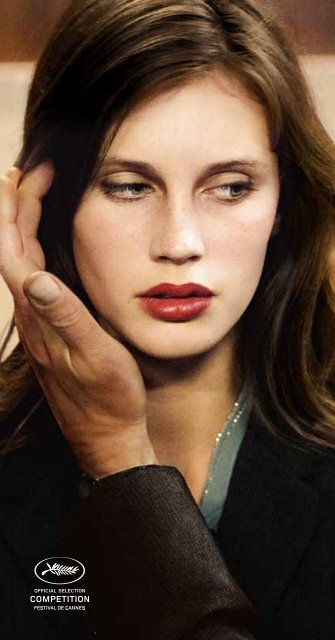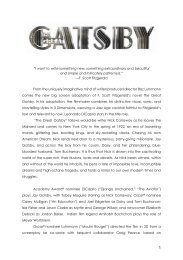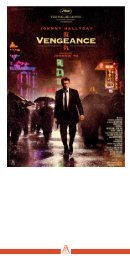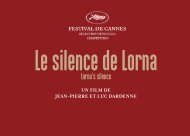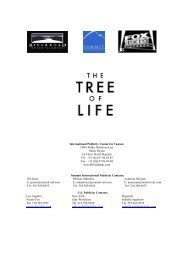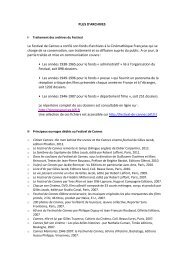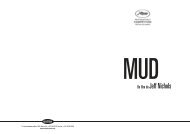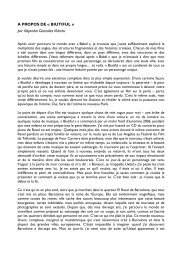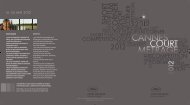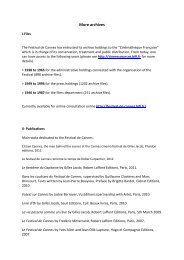Untitled - Cannes International Film Festival
Untitled - Cannes International Film Festival
Untitled - Cannes International Film Festival
Create successful ePaper yourself
Turn your PDF publications into a flip-book with our unique Google optimized e-Paper software.
INTERNATIONAL SALES<br />
Phone: + 33 (0)1 53 01 50 20<br />
Carole BARATON - cbaraton@wildbunch.eu<br />
Gary FARKAS - gfarkas@wildbunch.eu<br />
Vincent MARAVAL - ndevide@wildbunch.eu<br />
Silvia SIMONUTTI - ssimonutti@wildbunch.eu<br />
www.wildbunch.biz<br />
INTERNATIONAL PR<br />
MAGALI MONTET<br />
magali@magalimontet.com<br />
Cell: +33 (0)6 71 63 36 16<br />
Photos and presskit can be downloaded from www.wildbunch.biz<br />
MANDARIN CINÉMA<br />
PReseNts<br />
young &<br />
beautiful<br />
A FIlM by<br />
FRANçoIs ozoN<br />
MARINe VACth<br />
GÉRAlDINe PAIlhAs<br />
FRÉDÉRIC PIeRRot<br />
ChARlotte RAMPlING<br />
JohAN leyseN<br />
FANtIN RAVAt<br />
NAthAlIe RIChARD<br />
lAuReNt DelbeCque<br />
FRENCH RELEASE: AUGUST 21 ST<br />
RUNNING TIME : 94 MINUTES<br />
Image: 1.85 – Sound: Dolby SR/SRD
syNoPsIs<br />
The portrait of a 17-year-old girl<br />
in 4 seasons and 4 songs.<br />
3
4<br />
INteRVIew wIth<br />
FRANçoIs ozoN<br />
What was the catalyst for YOUNG & BEAUTIFUL?<br />
Directing Ernst Umhauer and Bastien Ughetto for IN THE HOUSE<br />
was such a pleasure I wanted to work with young actors again. My<br />
early shorts and features explored adolescence, but from UNDER<br />
THE SAND on, I’ve worked essentially with older actors. So<br />
YOUNG & BEAUTIFUL started with my desire to film the youth<br />
of today. And since I had just filmed boys, I wanted to film a young<br />
woman.<br />
Isabelle is not just any young woman – she’s working as a prostitute.<br />
The film is about what it feels like to be seventeen and experiencing<br />
the transformation of one’s body. Adolescence is often idealized in<br />
cinema. For me it was a painful period of complicated transition and<br />
I’m not nostalgic about it. I didn’t want to depict adolescence merely<br />
as an emotional time but also and above all as a hormonal one. Our<br />
bodies go through intense physiological changes, and yet we feel kind<br />
of numb. So we assault our bodies in order to feel, we test our limits<br />
physically. The theme of prostitution provides a way to highlight this, to<br />
illustrate the questions of identity and sexuality raised by adolescence.<br />
Sexuality not yet connected to emotion.<br />
Isabelle’s family is financially comfortable, so she’s not doing it for<br />
the money.<br />
Isabelle isn’t turning tricks to survive or to pay for school, she feels a<br />
visceral need to do it. She could have just as easily gotten into drugs<br />
or become anorexic, as long as it was something secret, clandestine,<br />
forbidden. Adolescence is a fertile period when anything is possible.<br />
That’s what’s so exhilarating about it, what comes across in Rimbaud’s<br />
poem No One’s Serious At Seventeen. You’re open to the world,<br />
unconcerned with morals. Isabelle is experimenting, embarking on a<br />
journey, her foray into prostitution is not a perversion.<br />
5
Isabelle is not so much exploring pleasure as she is confronting her<br />
absence of emotion, notably when she loses her virginity.<br />
During a conversation with Marina de Van I got the idea of showing<br />
duality in the character at the critical moment of her deflowering.<br />
Boys and girls alike may experience an out-of-body sensation as they<br />
discover their sexuality. You’re both there and not there, actor and<br />
observer. That scene prepares the audience for Isabelle’s double life.<br />
The film opens on Isabelle as seen through her little brother’s<br />
binoculars. Right away, she is objectified by a stolen gaze that<br />
“violates” her privacy.<br />
Absolutely. Isabelle’s behavior sets off strong repercussions and<br />
provokes powerful reactions from those close to her. Each season<br />
begins with the point of view of a different character. Summer is<br />
Isabelle’s brother, autumn is her client, winter is her mother and spring<br />
is her stepfather – though each time we rapidly shift back to Isabelle. I<br />
wanted to move through the film in a circular fashion around the four<br />
seasons. As in 5X2, I’m concentrating on specific moments to explore<br />
what’s going on.<br />
There is also a Françoise Hardy song for each season.<br />
Yes. I like to set up a formal framework inside which I have total<br />
freedom. It was important to me that the story should take place<br />
over one school year. The songs come like punctuation, suspended<br />
moments. This is my third time using Françoise Hardy songs, after<br />
Traüme in WATER DROPS ON BURNING ROCKS and Message<br />
Personnel in 8 WOMEN. I really like how she captures the essence of<br />
teen love: the heartbreak, the disillusions, the romance… I found it<br />
interesting to juxtapose this iconic viewpoint with a more raw portrait<br />
of Isabelle. Deep down Isabelle yearns to embrace this sentimental,<br />
idealized model of adolescence, and her parents also want that for her.<br />
But she must find herself, and confront her contradictions, before she<br />
can fall in love.<br />
Subway escalators, hotel hallways... you play with recurring locations<br />
as Isabelle goes to meet her clients.<br />
Like all clandestine experiences it becomes a ritual, involving a<br />
costume and recurring locations. The ritualistic aspect is what Isabelle<br />
likes: connecting on the internet, imagining who the clients will<br />
be, negotiating the price, going to meet them, etcetera. She tells the<br />
psychiatrist that she feels almost nothing during the actual act – what<br />
6<br />
excites her about prostitution is the adventure of it, the exhilaration of<br />
engaging in an illicit activity that breaks the monotony of her teenage<br />
existence. Many of the characters in my films share a desire to escape<br />
reality. At the end of the film some audience members are convinced<br />
she’ll start hooking again, that she’s addicted to it, like a drug.<br />
Teenage prostitution is a big issue right now. How did you approach<br />
this story without turning it into a sociological study?<br />
I did my research, of course, because things have changed since I was<br />
a teenager, notably the means of communication used to learn about<br />
sex: cell phones, internet... In my day, it was the Minitel! So I went<br />
looking for information. I met with police officers who work with<br />
juveniles, others who specialize in new forms of prostitution, and<br />
psychoanalyst Serge Hefez, who works with troubled teens. I needed<br />
this material to confirm my hunches and enrich the film. But then I<br />
needed to detach from it and let fiction take over.<br />
Isabelle’s father is absent but you don’t use that to explain her<br />
behavior.<br />
No. I provide a few clues that people can latch onto, or not. The<br />
reasons for Isabelle’s behavior are many. Everyone is free to interpret<br />
it in their own way. I like for the audience to have that freedom. This<br />
young woman is a mystery to me, too. I’m not ahead of her, I’m simply<br />
following her, like an entomologist gradually falling in love with the<br />
creature he’s studying. She says very little. The only time she opens<br />
up is during her second visit to the shrink. The idea is to accompany<br />
her, identify with her. We identify with much of what Isabelle and<br />
her parents are going through, undoubtedly because the situations are<br />
anchored in reality and the actors are very convincing. Each character<br />
is reeling from a complex situation, trying to handle it the best they<br />
can.<br />
How did you approach the sex scenes?<br />
I wanted them to be fairly realistic, but not degrading or sordid. I<br />
wanted to avoid moral judgments. Obviously some of the clients are a<br />
bit deviant, but the point is to show how Isabelle adapts. Isabelle is on<br />
the receiving end of other people’s desire when she has yet to discover<br />
her own. In a certain sense it suits her that others feel desire in her<br />
place. I didn’t want to embellish reality, but in a sense, Isabelle may be<br />
doing that herself.<br />
7
One client is different than the others: Georges.<br />
Yes, Isabelle and Georges have a connection. She may even feel<br />
pleasure with him. He touches her, looks at her. Their encounters are<br />
tender, not at all mechanical like the others. Despite his age, Georges<br />
is very attractive, seductive, sexy. That’s why I chose Johan Leysen for<br />
the role. I wanted the audience to believe he could appeal to Isabelle.<br />
Johan Leysen has a beautifully chiseled face, his voice and accent<br />
are charming. He has the physique of an American actor, like Clint<br />
Eastwood!<br />
What led you to Marine Vacth for Isabelle?<br />
As with the young lead for IN THE HOUSE, I realized it would be<br />
better to work with an actress who was slightly older than the role,<br />
someone with maturity and distance.<br />
I’d seen Marine in MY PIECE OF THE PIE by Cédric Klapisch. The<br />
moment I met her, I was struck by an impression of extreme fragility<br />
and at the same time, strength. She is extremely photogenic, and not<br />
just on the surface. <strong>Film</strong>ing her reminded me of filming Charlotte<br />
Rampling in UNDER THE SAND. Her face, the texture of her skin...<br />
there’s something going on beneath the surface. Her obvious physical<br />
beauty holds a mystery, a secret. It arouses our curiosity, we want to<br />
know more.<br />
This is her first leading role.<br />
And it’s a heavy role. We discussed it extensively beforehand, did<br />
readings and rehearsed with the other actors. I made sure she was<br />
very involved in the preparation process, let her help choose her<br />
costumes and follow the evolution of the script. I needed her to trust<br />
me, understand what we were doing, and bond with the other actors,<br />
especially Géraldine Pailhas and Fantin Ravat. The fact that she also<br />
models makes her very free with her body, which she uses like a tool.<br />
She was more comfortable than some actresses would have been.<br />
The mother character is also very important.<br />
Right. At one point I really wanted to shift the focus to her, to<br />
capture her reaction to her daughter’s sex life (and not love life).<br />
Prostitution exacerbates the situation, of course, but all parents must<br />
face these questions: How does their child’s sexuality affect them?<br />
What are their fears, anxieties? How much should they know about<br />
their child’s private life? How much should they interfere?<br />
8<br />
How did you imagine the mother-daughter relationship?<br />
I wanted them to be close in age but not to the point of being<br />
“friends”. I wanted the mother to come across as a very good mother,<br />
to prevent Isabelle’s foray into prostitution from being explained away<br />
as a consequence of their relationship. The mother is a very modern<br />
woman, like many mothers of my generation. I wanted her to be<br />
beautiful and sexually fulfilled, to avoid the mother-daughter rivalry<br />
so often seen in films today. That’s not what their relationship is about.<br />
Even when she catches her daughter in a late-night conversation with<br />
the stepfather, she does not feel threatened. This is not a story about a<br />
daughter taking her mother’s place. But Isabelle does have a diabolical<br />
side. We can see why her mother’s friend doesn’t want her husband to<br />
take her home.<br />
Nathalie’s fear is more about the mechanism of desire than Isabelle’s<br />
behavior.<br />
Absolutely. The idea that Isabelle could behave as a “whore” and<br />
contaminate everyone is mostly in the minds of those around her. She<br />
doesn’t think about it, but they do. Her beauty and her sensuality force<br />
them to confront the hypocrisy of their own desires.<br />
9
Isabelle is not angry at her mother for having a lover so much as she<br />
is angry at her for keeping it a secret, not trusting her.<br />
Adolescence is also a difficult period because children are discovering<br />
that their parents are not the heroes they thought they were, they’ve<br />
kept things from them, lied to them. Teenagers need truth, sincerity.<br />
They find out the world of adults is full of hypocrisy and lies, and they<br />
grow hostile toward these parents who have fallen from their pedestals.<br />
When the mother hits her daughter, we are more moved than<br />
shocked.<br />
I discussed this scene at length with my female friends. I asked them<br />
how they would react if, like Isabelle’s mother, they found out their<br />
daughter was working as a prostitute. Most of them said, “It’d be<br />
horrible, I’d blame myself, I’d try to understand.” They tended to<br />
evoke a positive, understanding approach, but then one of the women,<br />
whose daughter had gotten into drugs, admitted to me that when she<br />
found out, she hit her. That made sense to me. Parents who are at a<br />
loss for what to do or say to their sulking, withdrawn teenagers may<br />
quite naturally be pushed to lash out physically at them. As a mother,<br />
Géraldine agreed with this reaction but felt it was important for her<br />
character to immediately recognize the impulsive nature of her act and<br />
feel the need to apologize for it.<br />
How did you choose Géraldine Pailhas to play Isabelle’s mother?<br />
Once I’d chosen Marine, I sought an actress who could physically pass<br />
for her mother. I wanted a woman with a natural, maternal aura about<br />
her. I knew Géraldine, we’d already worked together, she had a small<br />
part in 5X2. We did some tests and they went very well. I could tell<br />
she was moved by the role and projecting herself into the story. She<br />
got really involved in the film. She was very protective of Marine, it<br />
was a beautiful thing to see. They truly bonded, there was no rivalry<br />
whatsoever between them.<br />
There is no rivalry with Georges’ wife either.<br />
No, Georges’ wife actually identifies with Isabelle. And as an actress,<br />
Charlotte Rampling can see herself in Marine, as can Géraldine for<br />
that matter. Both of them began their careers very young and were<br />
extremely exposed. I wanted the other actresses on the film to feel<br />
benevolent toward Marine. It was important to me that the other<br />
actresses represent a kind of transmission. Charlotte was an obvious<br />
choice, especially once I’d found Marine. She has played many<br />
transgressive, highly sexualized roles. She has often been perceived<br />
10<br />
as the embodiment of fantasy in film, making her ideal to play this<br />
woman who understands Isabelle without judging her. And when she<br />
takes Isabelle to the hotel room, Charlotte still exudes that transgressive,<br />
dangerous energy.<br />
Is that scene real or does Isabelle imagine it?<br />
The last shot suggests she may have imagined it, but it doesn’t matter<br />
whether it was real or a dream, either way the scene is healing. There<br />
is communication, a truthful exchange that Isabelle couldn’t have had<br />
with her mother. It helps her assume responsibility for what she’s done.<br />
Tell us about Serge Hefez, the psychiatrist.<br />
I met him while I was writing the script as part of my research,<br />
then had him read the script and comment on certain key points,<br />
particularly the psychiatrist’s attitude when Isabelle says she wants to<br />
pay for her sessions with the money she earned as a prostitute. I had<br />
some famous actors in mind, but Serge was so attractive and intelligent<br />
I offered him the role, and he accepted. His office inspired me for the<br />
office in the film, he even loaned us his chairs! He was very good in<br />
the screen tests, but I felt he was smiling a little too much. He told me<br />
that’s what he does with his teenage patients in real life. They generally<br />
come against their will, forced by their parents. So it’s important for<br />
him to connect with them right away, show them he’s on their side,<br />
even if it means being in opposition to the parents. I used that in his<br />
scene with the mother and daughter, he is clearly on Isabelle’s side.<br />
Tell us about the scene where the students recite, then comment on,<br />
the Rimbaud poem.<br />
I hoped to capture the fragility and beauty of adolescence in that<br />
scene. Other than Marine and the actors who play her friends and<br />
boyfriend, none of the teens were professionals − some of them<br />
were actual students from Henri IV. After they recited the poem, I<br />
asked them to analyze it for the teacher, express how they felt, give<br />
us their interpretation. None of that was scripted. I shot that scene<br />
like a documentary. I’d recently rediscovered VIVRE SA VIE (MY<br />
LIFE TO LIVE), another film about youth and prostitution, in which<br />
Godard interviewed actual prostitutes. I wanted to anchor my film in<br />
reality too, to hear the voices and viewpoints of these young people of<br />
today. Maybe to find out if they viewed the world the same way I did<br />
when I was seventeen.<br />
11
12<br />
2013 youNG & beAutIFul<br />
2012 IN the house<br />
2010 PotIChe<br />
2010 hIDeAwAy<br />
2009 RICKy<br />
2007 ANGel<br />
2006 A CuRtAIN RAIseR (shoRt FIlM)<br />
2005 tIMe to leAVe<br />
2004 5X2<br />
2003 swIMMING Pool<br />
2002 8 woMeN<br />
2001 uNDeR the sAND<br />
2000 wAteR DRoPs oN buRNING RoCKs<br />
1999 CRIMINAl loVeRs<br />
1998 sItCoM<br />
FIlMoGRAPhy<br />
FRANçoIs ozoN<br />
1997 see the seA (MeDIuM-leNGth FIlM)<br />
13
14<br />
INteRVIew wIth<br />
MARINe VACth<br />
What was it like when you met with François Ozon?<br />
Very straightforward. I did some screen tests for him, then read the<br />
script. I was moved by the story. It was clear and powerful. But I<br />
needed François to reassure me. I wanted to know how I would be<br />
filmed, what the film would look like, what its aesthetic would be. I<br />
felt comfortable with François right away. I like the mischievous glint<br />
in his eyes, and the way he works. He treats you like an equal. I never<br />
felt crushed by his authority, nor did I feel like I was being placed on<br />
a pedestal. After choosing me, François asked me to do screen tests<br />
with some other actors to help him finish casting the film. He wanted<br />
to see Géraldine and me together, to make sure the mother-daughter<br />
relationship worked physically. Same thing with Fantin, who plays my<br />
little brother. That was good, it helped me get into Isabelle’s skin.<br />
How did you approach the character of Isabelle?<br />
I can’t say I identified with her, but she touched me, I wanted to spend<br />
time with her. And naturally, as I played her, I brought part of myself<br />
to her.<br />
Did you express an opinion about how she should look?<br />
Not really, but François and I did discuss it a lot. Before the shoot he<br />
asked me to let my hair grow a bit longer, and he wanted me to gain<br />
a few pounds so I’d have some baby fat and look more like a teenager.<br />
Isabelle is not at all obsessed with her looks. She’s not a flirt, and she’s<br />
not interested in fashion. Costume supervisor Pascaline Chavanne<br />
and I tried a lot of clothes to find the right look for each season. In<br />
summer Isabelle is a blossoming young woman. She becomes more<br />
glamorous and sexy when she’s working as a prostitute, then turns<br />
quite tomboyish at the end, shedding those feminine artifices. She’s not<br />
particularly a young woman of today, she is simply a young woman.<br />
She has a timeless quality. François did not want the film to be some<br />
kind of sociological study on the current trend of students working as<br />
prostitutes to earn a living.<br />
15
And Isabelle doesn’t do it for the money.<br />
No, Isabelle turns tricks the same way she might have tried drugs<br />
or any other extreme experience: to confront the world around her,<br />
figure out who she is. Isabelle is no dummy when it comes to herself<br />
and others – in fact she’s smarter than most of the kids her age and<br />
quite a few of the adults around her. She takes responsibility for her<br />
actions. She makes no excuses.<br />
To the point of considering it natural to use the money she earned<br />
to pay for her shrink.<br />
That’s right, she’s never a hypocrite. We sense she is vulnerable but<br />
also strong, a unique young woman, a bit of a loner, not much into<br />
bonding with people or communicating. She doesn’t feel like talking<br />
about her experiences with prostitution, she doesn’t want to confide<br />
about it. Her silence moves me, I can relate. She keeps her distance<br />
from people. She’s there, and yet she’s not there.<br />
How would you describe her relationship with Georges?<br />
He’s an important part of her year of living dangerously, a year<br />
that will transform her. For one thing, Georges is the first person<br />
she feels actually sees her. And there is a tenderness between them.<br />
With Georges, she discovers another way to be, a form of intimacy,<br />
an approach to pleasure and eroticism. She can let herself go with<br />
him. She feels protected by their age difference, and the fact that their<br />
relationship is based on a business transaction. They can never actually<br />
be together. And Georges is important in her life because he causes<br />
her a terrible shock. She will feel, because of him, a strong feeling of<br />
guilt that will put an end to her experiments with prostitution.<br />
Perhaps if it hadn’t been for him, she would have continued as a<br />
prostitute and encountered a client more violent than the others.<br />
Right. In a certain sense, Georges is her guardian angel. But at the end<br />
of the film, Georges’ wife helps Isabelle even more, by unburdening<br />
Isabelle of her guilt over Georges’ death. And also her guilt at having<br />
been a prostitute – when she tells her that she, too, once fantasized<br />
about making love to men for money, but never dared try it. A bond is<br />
created between the two women, a kind of bond Isabelle has never felt<br />
with her mother. Georges’ wife gives Isabelle permission to be who<br />
she truly is. She transmits that to her.<br />
16<br />
One might imagine she exists only in Isabelle’s mind.<br />
I think she really exists.<br />
Isabelle has a hard time communicating with her mother and her<br />
biological father is absent.<br />
That was never a problem for me. I never thought about the absent<br />
father, except when the psychiatrist brought it up! François is really<br />
good at providing psychological clues without ever reducing his<br />
characters’ motivations to the level of cliché.<br />
In the car with her mother’s friend Véronique, Isabelle says, “I’m not<br />
the dangerous one.” So who is?<br />
First of all her mother, whom she suspects is having an affair with<br />
Véronique’s boyfriend. But in a larger sense, the danger is the desire<br />
Isabelle arouses in others, the way her youth and beauty force everyone<br />
to confront their own desires and frustrations.<br />
Isabelle seems very troubled by her mother’s affair with Peter.<br />
Isabelle catches her mother and Peter in a private moment at the<br />
theater, but she sees them from a distance, can she really be sure her<br />
mother is cheating? Maybe that’s just what she wants to believe, what<br />
she wants to see. I’m not sure it really bothers her. When she decides to<br />
17
confront her mother about it, I don’t think it’s because she’s shocked by<br />
it, or is judging her mother. Mainly she’s trying to create an exchange<br />
between them. She’s trying to stay her mother’s little girl.<br />
Do you think Isabelle is serious about her romance with her<br />
classmate?<br />
No. She’s trying to be, but I don’t think she’s convinced. Which is not<br />
to say she’s playing him for a fool. Aside from the boy she had a fling<br />
with on vacation, he’s the first boy her own age she gets involved with<br />
romantically. She likes him, she cares about him, he makes her laugh.<br />
She can relax with him, breathe easy. And he reassures her parents!<br />
What was the atmosphere like on set?<br />
Very joyful and pleasant. I really felt like part of a team. Everyone was<br />
working together for the good of the film. François is very pragmatic,<br />
I like that. He moves from one scene to the next, totally focusing<br />
on the work, wasting no time with pointless compliments. It was<br />
an exhausting role – I was in pretty much every scene – but I felt<br />
supported, carried, protected.<br />
How did you approach the nude scenes?<br />
I was a bit scared at first but ultimately, I approached those scenes<br />
like all the others! I was so immersed in the shoot and my role that<br />
I ended up forgetting myself. That’s a very nice feeling. Two months<br />
on a shoot... I’d never been so intensely involved in a project for such<br />
a long time. We shot almost all the scenes in chronological order. The<br />
further into it we got, the more I felt I knew Isabelle. Like an engine I<br />
warmed up, then shifted into high gear.<br />
What was it like working with Géraldine Pailhas?<br />
We gradually got to know each other and established a real bond.<br />
I think that bond helped create the emotion we feel between the<br />
mother and daughter in the film.<br />
And Charlotte Rampling?<br />
It was intimidating to find myself working with an actress I admire<br />
so much. She has such charisma, such beauty. She also really watched<br />
over me.<br />
18<br />
Do you want to continue working in film?<br />
I got started in this business – as I did with modeling – a bit by chance.<br />
Cédric Klapisch was looking for a model for a role in MY PIECE OF<br />
THE PIE. My role in Alexandre Arcady’s CE QUE LE JOUR DOIT<br />
À LA NUIT was also a bit of a fluke. I started to get the acting bug<br />
when I did THE MAN WITH THE GOLDEN BRAIN, a short film<br />
by Joan Chemla. And now, thanks to YOUNG & BEAUTIFUL, I’m<br />
really getting into it.<br />
FIlMoGRAPhy<br />
MARINe VACth<br />
2013 youNG & beAutIFul by FRANçoIs ozoN<br />
2012 the MAN wIth the GolDeN bRAIN<br />
(shoRt FIlM) by JoAN CheMlA<br />
Ce que le JouR DoIt À lA NuIt<br />
by AleXANDRe ARCADy<br />
2010 My PIeCe oF the PIe by CÉDRIC KlAPIsCh<br />
19
20<br />
INteRVIew wIth<br />
GÉRAlDINe PAIlhAs<br />
After 5X2, what was it like working with François Ozon again?<br />
Before offering me the role, François wanted to make sure Marine<br />
Vacth and I seemed like we could be family, but he still sent me the<br />
script right away. He’s very respectful. Nine years after 5X2, I was so<br />
happy he thought of me! Working together again felt very natural.<br />
We’re in tune with each other’s thoughts, words and actions. It was<br />
simple, easy.<br />
How did you feel when you read the script?<br />
François had given me the title and the basic storyline. As I read the<br />
script, I thoroughly enjoyed discovering his take on such a sensitive<br />
subject. I didn’t expect to be so shaken up. I loved diving into the<br />
vertiginous private world of this young woman. I understood<br />
her mother’s pain. I could hear François’ voice in his 17-year-old<br />
protagonist. It was beautiful. All that remained was to meet Marine<br />
and find out if we would make a convincing mother and daughter. I<br />
fervently hoped so.<br />
Did he take inspiration from your experience as a mother to flesh<br />
out your character?<br />
No, the script I read was pretty much the way we shot it. But François<br />
is attentive to remarks, compliments or criticisms, and regularly asks<br />
our opinion. It’s very nice. In the end he’s the one who decides, but he<br />
maintains an open atmosphere. I like how he seems so relaxed about<br />
his project. He’s totally committed, but chooses to keep things light<br />
and lively. That’s no doubt why he’s able to work so quickly and so<br />
often. He possesses that rare quality of making you believe everything<br />
is easy for him. Yet throughout the shoot he was constantly paring<br />
things down, eliminating details to get to the essence. He approaches<br />
his subject openly and without malice, making his love for his<br />
characters all the more palpable.<br />
21
Tell us about meeting Marine Vacth.<br />
The instant I walked into François’ office and saw Marine I was moved<br />
by this quiet young woman wearing no make-up, her hair tied back<br />
in a hasty bun, her teenage figure poured into tight jeans and a black<br />
turtleneck. She seemed reserved, even shy. But amazingly graceful. No<br />
visible signs of vanity. I was flattered that François saw a resemblance<br />
between us. He filmed our two faces next to each other. I sensed that<br />
we would have no trouble getting close.<br />
The resemblance between you two strengthens the motherdaughter<br />
relationship in the film.<br />
We’re witnessing this young woman’s sexual awakening. How does<br />
her mother fit in to her new life as a woman? More importantly, how<br />
does her mother not fit in? Isabelle needs a role model, but she also<br />
needs to detach from her role model. It’s fascinating how the physical<br />
resemblance between Marine and me can help explore these questions.<br />
To accentuate it, François had me lighten my hair.<br />
Tell us about working with Marine Vacth.<br />
From the very first take we were playing off each other, we were<br />
in sync, almost like two dancers. I think she could tell right away I<br />
liked her. And she liked me too. I’m not into rivalry between women<br />
and neither is she. We quickly overcame the obstacles inherent in<br />
relationships between actors, or between an older woman and a<br />
younger one, and were able to start bonding. I loved holding her face<br />
in my hands – that pouting mouth, still so childlike; those big green<br />
eyes, brimming with tears. Despite her shyness she let me in, and I was<br />
surprised at how strong my feelings for her were. She really moved<br />
me. Obviously the film’s subject matter and the roles we were playing<br />
facilitated that. It’s not easy for a young actress to play such a role. You<br />
really have to let yourself go, have complete trust. I don’t think Marine<br />
ever so much as batted an eyelid. She never expressed the slightest<br />
reservation or fear. I never heard her say, “I’m scared”. She blew me<br />
away. She’s got so much fight in her, and so much discipline.<br />
And you worked with Frédéric Pierrot again.<br />
I think it’s the fifth time we’ve worked together. He was in my first TV<br />
movie, seventeen years ago. He was also in LA NEIGE ET LE FEU by<br />
Claude Pinoteau. I love him, he’s a wonderful actor. Frédéric, Nathalie<br />
Richard… François put together a highly likeable group of actors, all<br />
particularly adept at disappearing into their characters, no big egos.<br />
22<br />
Tell us about the shoot.<br />
François spends his time cheerfully solving problems. I love his spark,<br />
his impatience, the way it gets the cast and crew hopping. I love to<br />
watch him getting results from the anxiety he arouses in us! He’s<br />
having fun and at the same time galvanizing us, he utterly respects the<br />
delicate nature of certain situations. On set, he knows how to strike<br />
just the right balance between complicity and distance. I also love how<br />
involved he gets with the clothes and hairstyles. He loves to play dolls<br />
with his actresses – dressing them up, doing their hair – and he’s not<br />
about to deprive himself of that pleasure!<br />
The scene where the mother hits her daughter is both brutal and<br />
emotional. The mother quickly asks her daughter for forgiveness.<br />
In the script that scene ended with the mother’s anger, but when<br />
we shot it, François let the camera run and I did indeed come back<br />
and implore Marine. François asked her to sit up and continue the<br />
scene. As the film progressed, François let things happen naturally and<br />
allowed us to take possession of our characters. He was nourished by<br />
our embodiment of them, and his vision nourished us, we felt valued.<br />
23
The mother you play is shaken up but not threatened by her<br />
daughter, though there are uncomfortable moments, notably when<br />
Isabelle comes home late from babysitting and has an ambiguous<br />
conversation with her stepfather.<br />
Yes, it was interesting to show a little glint of rivalry, one of those<br />
fleeting emotions inherent in all mother-daughter relationships,<br />
especially when the age difference is minimal. But I never wanted to<br />
stray too far from the reassuring quality a mother should have toward<br />
her daughter, with all the clumsiness and intrusiveness it implies. We<br />
know we shouldn’t say it, we’re aware of that, but it’s too late now,<br />
we’ve said it! I liked the irony of this crisis arising in a financially<br />
comfortable, educated family, where communication is favored and<br />
access to psychiatry is normal, common, even systematic.<br />
And they appear to be a happy family.<br />
Yes. Though there was a divorce, and undoubtedly the father behaved<br />
somewhat badly in the past, it would appear that nothing can break<br />
up this well-born little unit. The mother feels omnipotent, entitled to<br />
happiness, with her “little boy” and her “little girl”. Isabelle’s transgression<br />
is like a tsunami crashing down on the family. A violent wake-up call.<br />
The scene with the psychiatrist is quite funny.<br />
François wanted me to play the indignant mother to the point of<br />
ridiculousness. This is her chance to finally blame the father, unload<br />
what she’s been keeping bottled up inside. He told me, “This session is<br />
yours!” She kind of forgets for a while that the session is really about<br />
her daughter. We laughed a lot when we shot that scene. I think it was<br />
the only time François had cause to complain about Marine and me!<br />
Your character is constantly asking herself what made her daughter<br />
do this. Do you have an answer to that question?<br />
No, and I did my best not to seek one, not to ask the psychiatrist. It was<br />
better for my role. Anyway, can there really be one pat answer? Isabelle’s<br />
parents have divorced and her mother has no qualms about disavowing<br />
her father, that’s not great. But is it enough to push Isabelle to embrace<br />
prostitution as a form of sexual initiation? One possible reason for<br />
Isabelle’s behavior is the fact that her mother is not ready to let her<br />
daughter go. Isabelle can’t cut the umbilical cord, she has to rip it out<br />
by becoming a creature of her own making, excluding her mother,<br />
making her not “responsible”. That’s what Isabelle is really doing –<br />
creating a new identity for herself, and taking her grandmother’s name<br />
while she’s at it! She’s shaking up the family roles.<br />
24<br />
Maybe prostitution is also an extreme act designed to overcome her<br />
inability to feel things, as evidenced when she makes love for the<br />
first time?<br />
So much damage has been done by sanctifying virginity. And now it’s<br />
almost the opposite, teenage girls are anxious to rid themselves of it.<br />
You’ve got to get it out of the way, check it off the list. Even though it<br />
can shape your future sexuality. Something about the way she behaves<br />
that night leads Isabelle to believe she is master of her acts, her feelings,<br />
her emotions, her body. That feeling of control is something she will<br />
try to find again in the act of prostitution, in organizing her sexuality<br />
this way.<br />
But then she meets Georges.<br />
Yes, meeting Georges really shakes her up. And not just because<br />
he dies. She really feels something with him, and François films it<br />
beautifully, with great sensitivity. We are in her body with her, it’s<br />
amazing how much we feel. We’re so happy that she’s finally gained<br />
access to pleasure, both physical and intellectual.<br />
How did you feel when you saw the film?<br />
I was blown away by how the cleverness and tightness of the script<br />
disappears behind the powerful, gut-wrenching humanization of the<br />
characters. François filmed his characters, especially this young woman<br />
experiencing her sexual awakening, with so much love, so intimately,<br />
so honestly.<br />
25
26<br />
2013 sMs by GAbRIel JulIeN-lAFeRRIèRe<br />
DIVIN eNFANt by olIVIeR DoRAN<br />
2012 youNG & beAutIFul by FRANçoIs ozoN<br />
2011 PAulINe DÉteCtIVe by MARC FItoussI<br />
le PARADIs Des bÊtes by estelle lARRIVAz<br />
2010 hIs MotheR’s eyes by thIeRRy KlIFA<br />
2009 RebeCCA h. by loDGe KeRRIGAN<br />
bus PAllADIuM by ChRIstoPheR thoMPsoN<br />
2008 sPy(Ies) by NIColAs sAADA<br />
DIDINe by VINCeNt DIetsChy<br />
2007 les RANDoNNeuRs À sAINt-tRoPez<br />
by PhIlIPPe hARel<br />
2006 the PRICe to PAy by AleXANDRA leClèRe<br />
MADe IN PARIs by PAsCAl boNItzeR<br />
FAMIly heRo by thIeRRy KlIFA<br />
2005 sKy FIGhteRs by GÉRARD PIRès<br />
2004 they CAMe bACK by RobIN CAMPIllo<br />
5X2 by FRANçoIs ozoN<br />
I’Ve beeN wAItING so loNG<br />
by thIeRRy KlIFA<br />
FIlMoGRAPhy<br />
GÉRAlDINe PAIlhAs<br />
2003 the Cost oF lIVING by PhIlIPPe le GuAy<br />
2002 the ADVeRsARy by NICole GARCIA<br />
2000 eNChANteD INteRluDe by MIChel sPINosA<br />
1999 MAybe by CÉDRIC KlAPIsCh<br />
1996 hIKeRs by PhIlIPPe hARel<br />
1995 DoN JuAN DeMARCo by JeReMy leVeN<br />
le GARçu by MAuRICe PIAlAt<br />
1994 lA FolIe DouCe by FRÉDÉRIC JARDIN<br />
1992 IP5 by JeAN-JACques beINeIX<br />
1991 sNow AND FIRe by ClAuDe PINoteAu<br />
27
2013 youNG & beAutIFul by FRANçoIs ozoN<br />
2012 l’INNoCeNt by PIeRRe boutRoN<br />
PoPulAIRe by RÉGIs RoINsARD<br />
2011 Au CAs oÙ Je N’AuRAIs PAs lA PAlMe D’oR<br />
by ReNAuD CoheN<br />
IRIs IN blooM<br />
FIlMoGRAPhy<br />
FRÉDÉRIC PIeRRot<br />
by VAlÉRIe MRÉJeN et beRtRAND sCheFeR<br />
CheRRy oN the CAKe by lAuRA MoRANte<br />
PolIss by MAïweNN<br />
2010 sARAh’s Key by GIlles PAquet-bReNNeR<br />
sPeCIAl tReAtMeNt by JeANNe lAbRuNe<br />
2009 les FRIleuX by JACques FANsteN<br />
2008 let It RAIN by AGNès JAouI<br />
I’Ve loVeD you so loNG by PhIlIPPe ClAuDel<br />
28<br />
2007 ReD ANts by stePhAN CARPIAuX<br />
VeRy well, thANK you by eMMANuelle CuAu<br />
2005 holy lolA by beRtRAND tAVeRNIeR<br />
AVANt l’oublI by AuGustIN buRGeR<br />
2004 ClARA et MoI by ARNAuD VIARD<br />
A sIGht FoR soRe eyes by GIlles bouRDos<br />
2003 thAt woMAN by GuIllAuMe NIClouX<br />
MoNsIeuR N. by ANtoINe De CAuNes<br />
IMMoRtAl (AD VItAM) by eNKI bIlAl<br />
2002 VA PetIte by AlAIN GuesNIeR<br />
the DeVIls by ChRIstoPhe RuGGIA<br />
2001 the GIRl FRoM PARIs by ChRIstIAN CARIoN<br />
IMAGo by MARIe VeRMIllARD<br />
lA FIlle De soN PèRe by JACques DesChAMPs<br />
APRIl CAPtAINs by MARIA De MeIDeRos<br />
2000 MoDeRN lIFe by lAuReNCe FeRReIRA bARbosA<br />
1999 DIsPARus by GIlles bouRDos<br />
1998 DIs-MoI que Je RÊVe by ClAuDe MouRIeRAs<br />
FoR sAle by lAetItIA MAssoN<br />
çA Ne se ReFuse PAs by eRIC woReth<br />
1997 INsIDe out by Rob tReGeNzA<br />
ARteMIsIA by AGNès MeRlet<br />
PoRt DJeMA by eRIC heuMANN<br />
1996 FoR eVeR MozARt by JeAN-luC GoDARD<br />
CAPtAIN CoNAN by beRtRAND tAVeRNIeR<br />
les AVeuX De l’INNoCeNt by JeAN-PIeRRe AMÉRIs<br />
1995 My MAN by beRtRAND blIeR<br />
lAND AND FReeDoM by KeN loACh<br />
CIRCuIt CARole by eMMANuelle CuAu<br />
1993 the suRVeyoRs oF MoNtMARtRe<br />
by boRIs eustAChe<br />
1992 l. 627 by beRtRAND tAVeRNIeR<br />
1991 lA NeIGe et le Feu by ClAuDe PINoteAu<br />
1988 lIFe AND NothING but by beRtRAND tAVeRNIeR<br />
29
seleCteD FIlMoGRAPhy<br />
ChARlotte RAMPlING<br />
2013 youNG & beAutIFul by FRANçoIs ozoN<br />
2011 CleANsKIN by hADI hAJAIG<br />
NeVeR let Me Go by MARK RoMANeK<br />
the DuChess by sAul DIbb<br />
2010 MelANCholIA by lARs VoN tRIeR<br />
lIFe DuRING wARtIMe by toDD soloNDz<br />
2009 blAMe It oN MuM by CÉCIle teleRMAN<br />
RIo seX CoMeDy by JoNAthAN NossIteR<br />
2008 the MIll AND the CRoss by leCh MAJewsKI<br />
2007 All About ACtResses by MAïweNN<br />
2006 ANGel by FRANçoIs ozoN<br />
2005 heADING south by lAuReNt CANtet<br />
twICe uPoN A tIMe by ANtoINe De CAuNes<br />
bAsIC INstINCt 2 by MIChAël CAtoN-JoNes<br />
30<br />
2004 leMMING by DoMINIK Moll<br />
2003 swIMMING Pool by FRANçoIs ozoN<br />
2002 suMMeR thINGs by MIChel blANC<br />
IMMoRtAl (AD VItAM) by eNKI bIlAl<br />
I’ll sleeP wheN I’M DeAD by MIKe hoDGes<br />
2001 uNDeR the sAND by FRANçoIs ozoN<br />
2000 sIGNs & woNDeRs by JoNAthAN NossIteR<br />
1998 the CheRRy oRChARD by MIChAël CACoyANNIs<br />
1997 the wINGs oF the DoVe by IAIN soFtley<br />
1992 hAMMeRs oVeR the ANVIl by ANN tuRNeR<br />
1988 D.o.A. by RoCKy MoRtoN AND ANNAbel JANKel<br />
1987 ANGel heARt by AlAN PARKeR<br />
1986 MAX My loVe by NAGIsA oshIMA<br />
1985 he DIeD wIth hIs eyes oPeN by JACques DeRAy<br />
1984 loNG lIVe lIFe by ClAuDe lelouCh<br />
1982 the VeRDICt by syDNey luMet<br />
1980 stARDust MeMoRIes by wooDy AlleN<br />
1977 the PuRPle tAXI by yVes boIsset<br />
1976 the otheR sIDe oF PARADIse by ARtuRo RIPsteIN<br />
1975 FARewell, My loVely by DICK RIChARDs<br />
Flesh oF the oRChID by PAtRICe ChÉReAu<br />
1973 zARDoz by JohN booRMAN<br />
the NIGht PoRteR by lIlIANA CAVANI<br />
1969 the DAMNeD by luChINo VIsCoNtI<br />
1966 GeoRGy GIRl by sIlVIo NARIzzANo<br />
1964 the KNACK… AND how to Get It<br />
by RIChARD lesteR<br />
31
32<br />
CAst<br />
IsAbelle MARINe VACth<br />
sylVIe GÉRAlDINe PAIlhAs<br />
PAtRICK FRÉDÉRIC PIeRRot<br />
VICtoR FANtIN RAVAt<br />
GeoRGes JohAN leyseN<br />
AlICe ChARlotte RAMPlING<br />
VÉRoNIque NAthAlIe RIChARD<br />
PeteR DJeDJe APAlI<br />
FÉlIX luCAs PRIsoR<br />
AleX lAuReNt DelbeCque<br />
ClAIRe JeANNe RuFF<br />
PsyChIAtRIst seRGe heFez<br />
PolICewoMAN CARole FRANCK<br />
PolICeMAN olIVIeR DesAutel<br />
MouNA AKelA sARI<br />
MAN At hotel steFANo CAssettI<br />
MAN IN MeRCeDes PAtRICK boNNel<br />
lAb AssIstANt RAChel KhAN<br />
hotel eMPloyee GuRVAN CloAtRe<br />
IlIANA IlIANA zAbeth<br />
ChARlotte ChARlotte-VICtoIRe leGRAIN<br />
33
34<br />
CRew<br />
wRItteN AND DIReCteD by FRANçoIs ozoN<br />
PRoDuCeD by eRIC & NIColAs AltMAyeR<br />
DIReCtoR oF PhotoGRAPhy PAsCAl MARtI<br />
souND bRIGItte tAIllANDIeR<br />
lINe PRoDuCeR sylVAIN MoNoD<br />
1st AssIstANt DIReCtoR JÉRôMe bRIèRe<br />
CAstING DIReCtoRs sARAh tePeR<br />
leïlA FouRNIeR<br />
PRoDuCtIoN DesIGNeR KAtIA wyszKoP<br />
CostuMes PAsCAlINe ChAVANNe<br />
MAKe-uP GIll RobIllARD<br />
hAIR FRANCK-PAsCAl AlquINet<br />
eDItING lAuRe GARDette<br />
souND eDItING beNoît GARGoNNe<br />
souND MIXING JeAN-PAul huRIeR<br />
stIlls PhotoGRAPheR JeAN-ClAuDe MoIReAu<br />
CoPRoDuCtIoN MANDARIN CINÉMA<br />
MARs FIlMs<br />
FRANCe 2 CINÉMA<br />
Foz<br />
oRIGINAl sCoRe by PhIlIPPe RoMbI<br />
35
the soNGs by<br />
FRANçoIse hARDy<br />
“L’AMOUR D’UN GARÇON”<br />
(the LOve Of A bOy)<br />
PeRFoRMeD by FRANçoIse hARDy<br />
(b. bAChARACh - h. DAVID - F. hARDy)<br />
New hIDDeN VAlley MusIC Co. – CAsA DAVID MusIC<br />
1963 DIsques VoGue<br />
wIth PeRMIssIoN FRoM uNIVeRsAl MusIC VIsIoN<br />
AND soNy MusIC eNteRtAINMeNt FRANCe<br />
“À quoI çA seRt”<br />
(why eveN tRy?)<br />
PeRFoRMeD by FRANçoIse hARDy<br />
(F. hARDy)<br />
wARNeR ChAPPell MusIC FRANCe AND KuNDAlINI ÉDItIoNs sARl<br />
1968 KuNDAlINI<br />
wIth PeRMIssIoN FRoM eMI MusIC FRANCe AND<br />
wARNeR ChAPPell MusIC FRANCe<br />
“PReMIèRe ReNCoNtRe”<br />
(FIRst eNCouNteR)<br />
PeRFoRMeD by FRANçoIse hARDy<br />
(MIChel beRGeR)<br />
CollINe eD. MusICAles s.A.<br />
1973 weA MusIC<br />
wIth PeRMIssIoN FRoM uNIVeRsAl MusIC VIsIoN AND<br />
wARNeR MusIC FRANCe, A wARNeR MusIC GRouP CoMPANy<br />
“Je suIs MoI”<br />
(I AM Me)<br />
PeRFoRMeD by FRANçoIse hARDy<br />
(MIChel beRGeR)<br />
CollINe eD. MusICAles s.A.<br />
1974 weA MusIC<br />
wIth PeRMIssIoN FRoM uNIVeRsAl MusIC VIsIoN AND<br />
wARNeR MusIC FRANCe, A wARNeR MusIC GRouP CoMPANy.<br />
36
Photos Jean-Claude Moireau


